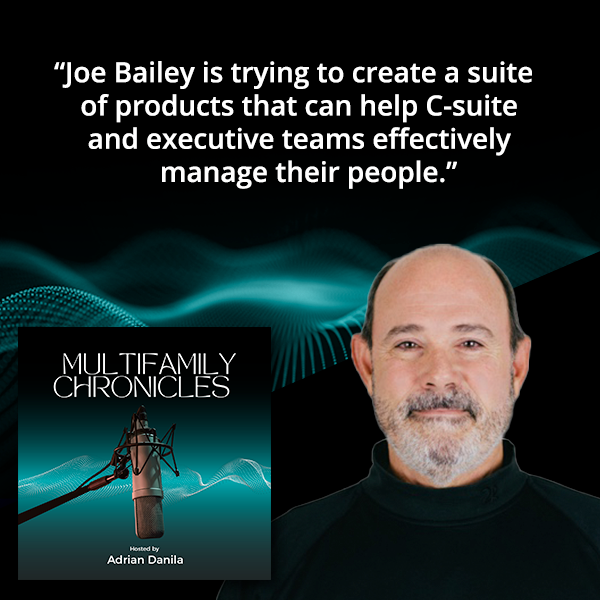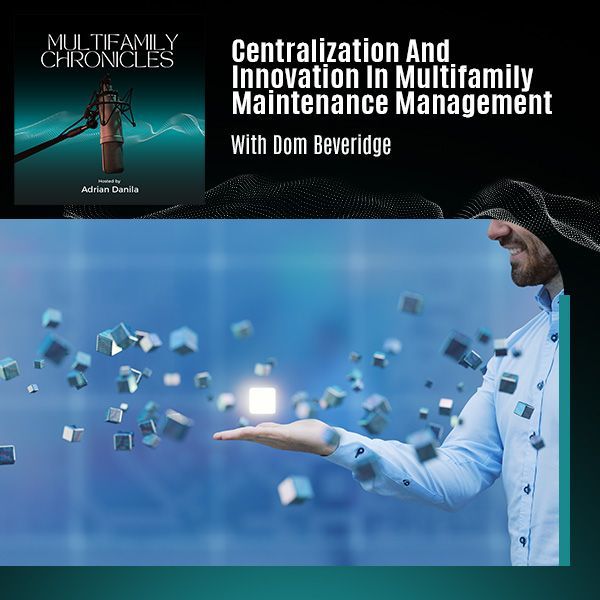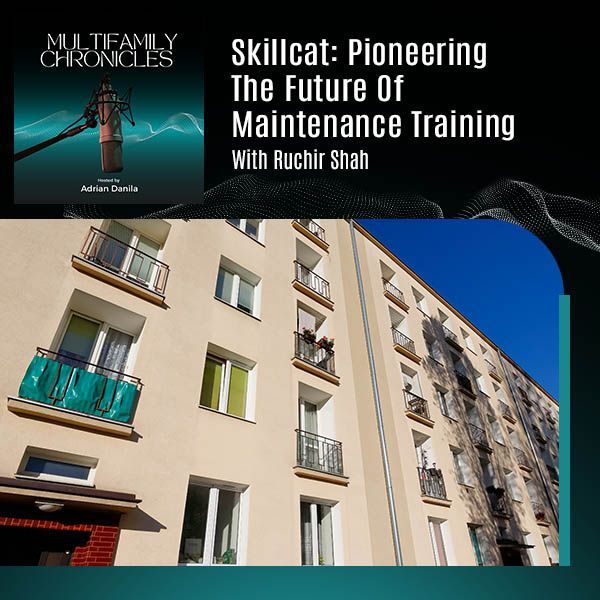The Employee’s Market: Fixing Employee Engagement With Joe Bailey
Employee engagement is one thing some C-suite teams don't take as seriously anymore. Remember, we are in an employee market right now, not an employer's market. As a leader, you need to engage with your employees and stick to your word. If you give a survey, don't just pack it up on a shelf somewhere and forget about it. You have to listen to their opinions. That is so important right now. Join Adrian Danila as he talks to the CEO and founder of Swift Bunny, Joe Bailey. Learn how you can keep employee retention, especially now in the multi-family industry. Discover how you can successfully manage your team so that they respect you as a leader. Find out how to onboard new hires better. And discover more about Joe's journey into Grace Hill and now, Swift Bunny. Start running your business as a true employee-led leader.
---
Watch the episode here
Listen to the podcast here
The Employee’s Market: Fixing Employee Engagement With Joe Bailey
We have a very special guest. It's Joe Bailey. Joe Bailey is the Chief Executive Officer of Swift Bunny. Welcome to the show, Joe.
Thanks for having me, Adrian. I appreciate being here.
I wanted to start by introducing you to the audience for a very few people that don't know who you are. You've been around for a long time. You've done some amazing things in the industry. Why don't you tell us a little bit about your background?
I would be glad to. I've been in real estate management now for many years. I started in the resort-hotel business. I went from there to commercial and then finally to multifamily. I've had the opportunity to work on both the management side of multifamily as well as the vendor side of multifamily. On the management side, my biggest career move was with Merry Land & Investment Company. We were one of the original four apartment REITs out there in the country. I started with them. I spent about twelve years with them and helped grow their portfolio from about 1,500 units to 35,000.
That was an experience for us. That was back in the late '80s or early '90s when the RTC was selling stuff at pennies on the dollar and Wall Street was throwing capital at multifamily. We had a growth spur. It was a lot of fun. I enjoyed that. In 1998, the company was sold to Equity Residential. I was playing golf and enjoying myself for about two months. My wife told me I needed to get back out and get a job. We started a little company called Grace Hill Incorporated or GraceHill.com.

We weren't on the leading edge. We were on the bleeding edge of trying to introduce online and web-based training to the multifamily industry. That was a thing because back then, very few folks were using the internet for this type of venture. A lot of folks we talked to loved the product but they couldn't access it because they didn't have access to the net. We went through a lot of tough years of trying to get that thing up and running and get it accepted by the industry.
We finally did and ran it pretty successfully for about seventeen years. In 2014, we finally decided to sell it. I was planning on retiring, which I was able to do for three years. One of my original partners and friends from all the way back to Merry Land was Kara Rice. She called me up and said, "Are you done?" I said, "What do you mean I'm done?" She says, "Do you want to sit on your butt for the rest of your life? Do you want to go back to work?" I said, "I would like to go back to work. What did you have in mind?"
We started this company, Swift Bunny in 2018. It has been a ride for us because we were ready to launch our products and services in February 2020. Probably all your viewers remember that was not a great time to try to launch a company. Most companies were getting shut down at the time. I've been with Swift Bunny now. It has been a lot of fun. We're starting to gain some traction. Things are getting pretty exciting.
I want to go back a little bit to the Grace Hill story because as everybody knows, Grace Hill is probably the leading educational platform in the industry. It has been for years even before you sold the company. First of all, I'm curious. Where is the name Grace Hill coming from? I always wondered why Grace Hill.
When we're in a trade show booth, people wouldn't ask us about it. They say, "Who is Grace Hill?" They thought it was a person. We got that question asked of us so many times. The truth of the matter is that Gracehill is the name of a small town located in County Antrim in Northern Ireland where my family is from. It's my dad's side of the family. It's funny because when we created the company, we had Grace Hill as two separate words. I didn't realize this at the time but the name of the town is one word, Gracehill, all run together. That's where the name came from. My family had thirteen brothers and sisters that came over in 1825 from County Antrim in Gracehill. We've got a lot of Baileys in the Southeast down here and in the Charleston area. That's the name. There's nothing else to it.
If I remember exactly, back in 2004 or 2005, the website had a lot of green in it. I saw some shamrocks too. Am I wrong in remembering that?
You're right about remembering that. We had a Gaelic look at the name and the way the logo was designed. It had a shamrock over the eye as the dot on the eye. It was a nod to my heritage. They have changed the logo since then. It's not there anymore but it was a lot of fun for a lot of years. We enjoyed it.
That's an amazing story. If you were to look back from when you started the company and how the company evolved, what would you say was your vision? What did you want it to become? What did it end up becoming under your leadership?
Originally, the reason I started Grace Hill was when I've been on the management side, it was always frustrating to me about the fact of how reticent some people were to share marketing information. You want to find out what was going on in the marketplace, what specials were being offered, what market rates were being offered on a 2-bedroom or a 3-bedroom, or what have you. You call around to your competitors. A lot of times, they didn't want to tell you anything. It was very tough to get any information.

When we started Grace Hill, the original idea behind Grace Hill had nothing to do with eLearning. We wanted to create an environment where people could anonymously share as much information as they wanted about anything like forms or letters, talk about market stats, this, that, or the other, and create an open forum where folks could share information and ideas and ask questions, "What works for you when this happened?" Somebody could say, "We tried this. That didn't work, and this did work."
We wanted it to be an open platform. We were cruising along. We weren't making a lot of money. We weren't doing that well business-wise. Believe it or not, my father was an educator and a professor of Medicine for 60 years. He came to me one day. We were talking about this. He said, "The success of Grace Hill is going to come off of education." My dad could barely turn on a computer. Here he was telling me exactly what was going to work for us.
We started investigating that and found the company up in Greenville, South Carolina. We were based in Augusta, Georgia, about two hours away. We went up there and talked with these guys. They were all into eLearning. They had worked on eLearning for big businesses and big industries around the country. They said, "We can do the same for you and help you out with this." We started learning the things that we needed to learn to create a program that would make sense. We went from being this open information-sharing platform to being an e eLearning company purely almost. It worked.
I'll tell you a quick story. We had a forum section on Grace Hill back in the day. It was where people could post forms like pet addendums, leases, all things that they used day in and day out, move-in forms, and what have you. You could download them for free. It didn't cost you a dime. You could make copies and use them throughout your organization. That was years ago.
My son has gotten a job as a leasing agent in South Florida. He started. He was going over the forms that they had in the book there in the office. He looked up in the top left corner of one of these forms. There was the old Grace Hill logo up in the top left. Some people are still using them out there. It was amazing. He called me and told me about that. That tickled me pink.
This says a lot about the legacy that you created with this project. It's an amazing story to share. A lot of times, we underestimate the impact that we have on the world until a story like this happens. Most stories like this are untold. They remain untold. People don't say anything about it. Luckily, your son saw the logo and passed on the story to you, which is extraordinary. Things don't last nowadays in six months, and you were talking about a form that was passed on by generations because you're talking about generations.
When we're thinking about the turnover rate in the industry, do you imagine how many managers went over and passed on that form? There were probably 30, 40, or 50 managers and hundreds of leasing consultants in the same place. The work is still there. That's truly amazing. It speaks volumes about the impact that you had at the time with the project and still do. That's such an amazing story.
Next, I wanted to ask you about being a successful company founder and an executive. A lot of folks moving up in the industry, whether they're on the management side or a vendor-partner side, want to become more. Some of them have the dream to become executives. From your experience, what are some things that you would like to share with people that have the goal to reach all the way up to the top? What are some things to look for? What are some things that helped you throughout your career to become as hugely successful as you are?
I've had some help along the way. You don't get to be an executive and own a company or run a company without a lot of help along the way. I've had some mentors that were priceless to me. Probably one of the greatest businesspeople I've ever met was a guy named Peter Knox. Peter was the Founder of Merry Land & Investment Company. He's a great guy. He knew how to run the company. He understood the business but most importantly, he understood the people that he had hired to work for him.
You don't get to own a company or run a company without a lot of help along the way.
He had a saying that was impressive to me. He says, "If you want to be successful, find the best possible people you can find to fill the positions in your company to do the various things that need to be done. Train those folks. Give them all the support and technology or whatever they need to do the job. For God's sake, get the hell out of the way and let them do it." That's what he said.
I've heard other people say that over the years but he was the first person that ever said that to me. That made an impression on me because that's exactly the way he ran his company. He was extremely successful with what he did. The great thing is people liked him. They wanted to work for him because he was willing to do whatever he had to do for them so that they could do their jobs. They wanted to work for these companies. They were committed to working for them.
That was a great lesson for me. If you hire great people, you have to support them. You've got to do whatever you can to make their lives such that they can come to work every day and feel enthusiastic about what they're doing. You want them to be committed to the company and whatever path you're trying to go down. Life throws obstacles at all of us all the time. As an executive, you've got the power and the privilege to be able to help those people overcome those obstacles and problems that come their way. If you do a good job of that, it's amazing what can happen.
That's very powerful wisdom right there. Find the best people. Give them everything that they need, tools, and training. Train them well. Get out of the way. Let them do what they're best at. I'm a firm believer in those principles myself. I'm surprised that it's not the norm in my experience in the industry. It's the other way around. Examples of having this type of leadership make such a huge impact and make people feel like they belong to something. You get this buy-in to your plans and dreams. If you don't get buy-in, how are you going to get people to work hard for you?
I'm hearing often that managers are looking for someone with an ownership mentality. You expect an employee to bring to the table an ownership mentality but you don't give them any type of ownership. It doesn't have to be a monetary incentive. You don't have to make them part of the ownership of the company but make them part of the ownership of the ideas they're implementing and their plans.
That's a great start right there to bring them in, get them to contribute, and listen to them. We will get hopefully later on to discuss some of those issues. It's very important. I would like to get your take on it. What is so powerful about getting this buy-in and this ownership thing? How do we make people feel part of owning the company?
We have done this over the years. When we were trying to come up with new ideas or change our product, make it better, or what have you, it's easy to sit down with a small group and discuss it but what we would like to do is bring as many opinions in as we could. We listened to these opinions. The worst thing you can do as an owner, an executive, or a management person is to ask for an opinion from somebody, have them give you that opinion, ignore it, stick it in the drawer, and call it a day. That's what happens so often.
One of the things we do at Swift Bunny is survey people about what's going on. One of the key things we tell executives and clients is, "Don't survey somebody, look at the survey, put it in a folder, stick it in a file somewhere, and not pay attention to it." That is the worst possible thing you can do. If you want to ask folks their opinion about something, get their buy-in or their input on it. If you want their opinion about it, do that but then act on that.

Communicate back to that person. When I say, "What do you think of this idea?" and then you tell me, and I hang the phone up, you're expecting some feedback from me to say, "That's a great idea. There's no way in heck that's going to work because of blank." You want some feedback from me about what you said. If I give you that feedback, that makes a big difference. If I don't, it's a real problem.
This brings me to my next question. You're leading Swift Bunny, a very successful company that you have founded. I wanted to ask you to share with the audience right here what are some great things that are happening at Swift Bunny and what type of services your company is offering. How do they help the industry?
We're trying to create and working on creating a suite of products that help you manage your people to help you manage the folks who work in your company as an executive team or a C-Suite team. What we want to do is create things that you can use to understand the opinions, problems, and issues that your employees have and how to rectify those and make them better there.
There are four major components that we have to what we're offering at Swift Bunny. We have a product called Ingage™, which is able to measure employee engagement within your organization on an ongoing basis throughout the course of the year. We turn the data from that around to you and show you what you're doing right and what you're doing wrong. We take it a few steps beyond that because we don't want to say, "This is right and this is wrong." We want to say, "Here's how you can solve and make these things that are issues better. You can resolve these issues."
We give you ways to go after and attack these problems within your organization and then give you ways to track whether what you're doing is working or not. It's not just a survey. It takes you all the way through to resolving the issues the survey identifies and then gives you a way to make sure that at the end of the day, they were resolved. That's one thing we're doing.
We're doing a custom survey solution, which allows you to ask your questions. The Ingage™ solution is one that allows you to benchmark yourself against the entire rest of the industry when it comes to employee engagement. We've got a resident satisfaction survey product. A lot of folks use resident satisfaction surveys to boost their ratings on Yelp, online, on Google, or what have you. We like to use them as an indicator of how good a job is and how engaged and focused the people on site are in terms of what they're doing day in and day out. We have a product that's focused on making that happen.
Last but not least, the product that we're launching is called Introduce, which is an onboarding product. It allows you to onboard your employees in a very trackable and easy-to-work way. As an industry when it comes to onboarding, we do a terrible job of onboarding. It's a fact. You will lose half of the people that you will lose at your company within the first 6 months or the first 90 days of having them as an employee. Making sure that you do a great job onboarding the employee is key. If you do a good job there, then you stand a much better chance of keeping that employee long-term. As you know from the statistics out there, trying to find an employee to fill an open position is tough.
Onboarding is key because half of the people that you'll lose will happen in the first 90 days to 6 months of their job.
I want to stop at the onboarding part because it's one of the things that I'm passionate about. I don't disagree with you at all. We are doing a terrible job as an industry. There's so much room for improvement. I'm going to take an example of a new maintenance technician coming on board the first day. They're showing up, "Good morning." Most of the coworkers don't even know who the person is. The supervisor and the property manager probably know. They don't even get introduced.
They're waiting around and looking for someone to ask them, "What's your business right here?" That finally happens, and then the manager comes and grabs them into the office, "Come in. We have to do the new hire's paperwork. Let's do this fast because we have some work to do." They're pushing the guy filling out the paperwork, "Have you finished it? How much more?" Finally, you get them through the process. Everything is done. You could submit it to HR.
The next thing you know, it's like, "You're here. Here are the keys. Here's a stack of 100 work orders. We're so far behind. See if you could get at least 50 done. Have a great day." It is the typical scenario. What managers fail to realize is that there's stress, to begin with, when you start a new job. You don't know the person and the people well enough. You don't know the environment and your residents. Probably you don't know the company well enough. There's so much that you don't know.
On top of that, they're coming in and dumping all this work on you. They expect you to perform some magic on your first day. That's the typical way of onboarding maintenance personnel. With that being said, I would like for you to share some tips and some things that you know and learned that could work to do things differently and for us to do a better job at onboarding.
Several things come to mind. One of the most important things is that prior to the employee getting there for their first day, they need to understand what it is that's about to happen, "You're going to come in on this day. We need you here at this time in the morning. In your first week, we're going to do this and this in this order." There are so many other things to do other than fill out new hire paperwork. For example, do they need an employee company email address? Do they need login credentials for the property management software or the maintenance software that's being used? Do they need a uniform? Do they need a name badge? Do they need business cards?

If you go down the list, there are a ton of things that need to be done. Some of these things can be done prior to them ever showing up for their first day. If you know their name and what the standard company policy is regarding how to do email addresses, maybe it's YourFirstName@ABCManagement.com, JoeBailey@ABCManagement, or whatever it is. You could submit that to your IT department and go ahead and set that up well in advance of them showing up for their first day. The point is that people don't do that. They don't take the time to prep beforehand.
Your existing staff needs to understand, "We hired Joe Bailey as a new maintenance tech. He will be starting next Monday at such-and-such time. Fred, I want you to mentor Joe when he gets here. I want you to be his mentor the first week or the first two weeks." There are all these things that can be done beforehand but we're so busy and shorthanded out there. People are running like rats on a wheel. It's unbelievable how much overwork we've got. It's not surprising that things fall between the cracks maybe even more so than they did before but these are the things that need to be done.
There's a lot going on. There are a lot of other vacancies. Maybe it's your property. You still have to take the time to do this. When you lose an employee, the cost of losing an employee is huge. It's off the charts. The longer that position remains unfilled, the more expensive it is to your company in terms of cost. At the end of the day, take the time to do the prep work. Whatever it takes, you have to do it. If you don't, your chances of losing that employee pretty soon after hiring that person get pretty high. Prep work is a key thing.
Preparation is the name of the game. One of the things that you did say is the cost associated with losing employees. This could turn out to be a lot. Why can't we do some great work, to begin with, or prep work and avoid that? Make them feel it. It's not just for the new hires. It's more so for the new hires because there are more stressors for them to deal with or the unknowns that I mentioned prior like the company, new people, and so forth but it's also for the existing staff when you're short-staffed. Probably 95% of places out there, especially property level are.
When you're short-staffed, don't make your employees feel like you are punishing them for being short-staffed. It's not their fault that the property is short-staffed. Therefore, when you keep adding more work to them because there are not enough people to properly do the work and have a proper workload, you make them feel like they're getting punished for being around. That is not a good mental situation, not even a physical situation to be in because they end up working 50 to 60 hours a week in 100-plus degrees heat out there. That makes them break. I'm hearing real-life stories all the time. They're heartbreaking. We can't keep doing that to our people.
One of the easy things to do that any manager on site can do or any maintenance supervisor can do is when you're talking to the employees if you empathize with the fact that you understand that they're overloaded, you understand that they're working their tails off to get stuff done in 100-degree heat or what have you. It's the fact that you recognize that and that you shared that with them, "You're not alone in this. I feel the same way, and so do the rest of the team here." Having time to talk to each other about this stuff is a big deal.
When I run a property, I would sit there on Monday mornings and have my staff together. We would have coffee, talk about the week to come and what's going on, and share information about how people are feeling, what's going on, and the stress that they're enduring. We've got four things that are major factors that Swift Bunny is determined from all the surveys we have done about the things that are major issues for folks on site. There are four recurring themes that we see no matter what company we're surveying and no matter where it is in the country.
One of those things is the stress levels on site and the workloads being more than they're used to because they got a vacancy here and here. The workloads are a real issue. It's a big factor in why people walk, leave, and go somewhere else. Recognizing the fact that there are issues, there's stress, and there's too much work to be done and not enough people to do it is a plus and can help at least make folks realize that the company cares. We're not just here. We're experiencing the same things you are. We care about you.
Workload and handling stress levels are big factors in why employees walk and go somewhere else.
That makes a tremendous difference for sure. Here's the next question that I have. I want to get your take on it. I read a report from Gallup that indicates that 40% of US employees are engaged, enthusiastic, contributing and committed to their work. The rest of them are either in between, "We're showing up here," or they're downright miserable at their jobs. 60% is very concerning. It should be concerning. With this being said, what are some things that you see from your surveys of employees being surveyed at various companies across the country? What are some solutions that you're proposing to your clients when it comes to this type of lack of engagement?
I'll go back to these four factors that I mentioned. There are four reasons why people are having issues out there. These are the highest issues of all the issues we look at. We look at a lot of them but these are the four that sit at the top of the list. I want to talk about the most obvious one first, and that's compensation. When I say compensation, I don't mean wages. I mean the entire package, your benefits, your paid time-off, any type of profit sharing, employee stock option plans, and insurance. When you put all this stuff together, it's a package.
If you're an operator out there, and you haven't looked at your compensation package within the past six months or so and made some revisions to it, you're probably running behind when it comes to trying to hire good people. Compensation is going up. There's no question about it. It is an employee's market, not an employer's market. The latest numbers I've got to define that a little bit further is at the end of the second quarter of 2022, we had 10.7 million vacant positions in this country. That includes not just multifamily. That's everything.

In a normal year, pre-pandemic, there's roughly about the same number of people looking for jobs as there are jobs. It could be slightly up or slightly down either way but they're roughly the same. In terms of people actively seeking jobs in this country, there are 5.9 million people looking for a job. They have looked for a job within the past 12 months and within the past 4 weeks of the time this survey was taken. Think about that. Round the numbers off. There are 11 million vacant jobs. We've got 6 million people looking.
That means that roughly for every two jobs out there, there's one person looking for a job. In addition to that, we had 1.5 million marginally attached individuals. They have looked for a job within the past year but not within the past month of the time the survey was taken. This all comes from the Department of Labor. Out of that 1.5 million, 424,000 are what are called discouraged workers. They have not looked for a job within the past year.
We have this huge amount of folks out there that have left the workforce abandoned, looking for a job. We have all these vacant job openings. We only have a fraction of the number of people that can fill those jobs. They're looking for jobs. Compensation becomes key. If I walk into your office and you tell me what your offer is, and it's not good enough, I'm going to go down the street. I've got fourteen other companies I can talk to, restaurants, and hotels. You name it. It doesn't have to be multifamily. I can be a maintenance tech in multifamily. Believe me, I can get a job in a lot of different places.
Making sure that the compensation package your company offers is key. It's important to make sure you're up to date in the salaries and benefits, especially that you offer are competitive, not just with the other multifamily operators down the street but the other companies around town. That's one big thing. That was a huge factor on this list. The second one is understanding a career path and what my future is. If I come to work for you at your company, I need to have a clear understanding of how I can progress in the company. What's my potential? If I'm starting as a maintenance tech, how do I become a manager, a maintenance supervisor, and a regional manager? How can I work my way up the path?
A lot of companies don't talk about that enough. They don't market that enough. One super simple solution to that is to market your job openings. When you have a vacancy, market them internally first. Make sure that your people understand that you're not talking to the rest of the world about this job opening yet, "I'm talking to you first. I'm giving you the first shot at this." That makes the employees understand that in a sense, you've got their back. You're going to give them those opportunities first before going to anybody else in the world.
We talked about stress. There's not a ton you can do about it except to recognize it and talk with people about it. If people want to go to counseling, offer free counseling. Get together with somebody locally, a psychologist that can sit down, or a group that can sit down and talk to your folks if they want to, either individually or in groups. With the NAA, we did two mental health surveys for the industry, one in the fall and then the other in the past spring right before NAA.
The stress levels were through the roof out there. There's no question about it. The survey results show us that. At the end of the day, it becomes important. Anything you can do to recognize the stress will make a big difference but if you can help them with that through counseling or something like that, there's no shame in that. They need to make that statement, what I said. They need to say, "There's no shame in feeling stressed and telling the world that you're stressed. We all are. We're going to offer you services and ways to help you resolve some of that stress."
The last thing is the onboarding. You said it so well. You said, "You have to get organized. You have to have this stuff nailed down and organized." Whether you use Swift Bunny to help you with the onboarding, do a better checklist, or what have you out there, whenever it takes, you need to do a better job of it because if you don't onboard properly, you are going to lose that employee.
One last thing to mention is the cost of the turnover of an employee is pretty high but there are some things that come from it that are even higher. Residents look at the leasing office. If they see a revolving door in the leasing office, they're more likely to leave themselves. Employee turnover directly impacts resident turnover. It's a fact. The cost of resident turnover is even higher than the cost of employee turnover. The two are linked and related. You want to make sure that you do a good job with the onboarding because if you lose that employee, the total cost of what it's going to impact you is huge.
Employee turnover directly impacts resident turnover.
I couldn't agree with you more on every single point that you made. I want to touch on the first one that you mentioned. It's compensation and the whole package. The conversation that I'm hearing most often in the industry is this. We are paying competitive wages, and people don't want to work. This is the statement that I'm hearing most from hiring managers.
I can't help myself but ask a follow-up question. How do you define competitive? The answer most of the time is that we are paying the same as our competition pays. We're maybe a little over that. I ask, "Don't you realize that they have the same problems?" They're not solving the problems. You are taking a failing model or a model that's not too successful, copying it, replicating it, and expecting a different result. I'm telling people that.
There's a wage comparison that I've done for the Tampa market. I've noticed that there were plumbing companies out there hiring young folks right off the school gates. They could make in a year more than an experienced service manager makes at a multifamily property. A company plumbing company hires guys right out of high school to teach them the trade, and they get paid. They could take more money home than an experienced service manager in the multifamily industry. How can we realistically think that we're going to keep our existing talent or bring new talent into the industry when we're so far behind?
You can't pay an experienced maintenance supervisor enough. I almost mean that literally. We talked about compensation. If you're talking to a candidate out there or somebody brand new that wants to come in and work for you, you need to have a competitive package but in doing that, you can't ignore the fact of the people that you already have on payroll. You've got to look at their compensation and adjust accordingly.
When that experienced maintenance supervisor finds out that a brand new maintenance tech has been hired and been paid a $10,000 signing bonus and is making more than they are, guess what's going to happen with the maintenance supervisor? They're gone. You've lost them. You can't forget your existing employees. A lot of folks do that. They try to get competitive on what they're offering to new hires but you can't forget your existing people.
There was a question on one of the Facebook groups. It was on Multifamily Insiders or Multifamily ShareSpace. Someone was asking, "What would you prefer? Should we pay extra bonuses to the new hires or hiring bonuses? Should we pay the existing employees?" In my opinion, we should do both. It's not one or the other. It's all of them. It's not an either/or situation. We're not doing either this or that. We have to do both. This way, we keep our current employees in place. We're bringing new talent in this way. It's not like we either do new-hire bonuses or stay bonuses or whatever you call them.
You have to do both. You need all those people. You can't have somebody on site working there with vacant positions. They're going to get stressed. It's like a snowball going downhill. If they're stressed and they get beyond their limit, they're going to leave too. At some point, you have to bite the bullet and understand that in this market, it's going to cost you a lot more to staff these properties and do the right things in terms of compensation packages.
The other thing that strikes me about this though is that there is a point at which compensation becomes too expensive for the operator where they say, "I understand I need to pay this person this much money," but at some point, they might say, "I can't afford it. I can't do it." You and I talked about this when I saw you down in Tampa. The strategies for how you staff for property, how many people you put in maintenance, and how many people you have in the office and those things are starting to change.
Folks are looking at things like outside contractors to help out with the maintenance as opposed to having the folks on staff thinking that maybe that will come in at a cheaper rate. I don't know what the pricing on that is, to be honest with you. I'm not sure how that all tabulates out but it's something that people are starting to look at. They're going to change the way they look at staffing these properties. That will in turn change the way they end up compensating whatever employees they do have left over.
I do see the trend myself. For full disclosure, I work for a company that offers maintenance services. My company services single-family and multifamily institutional owners. They're considering outsourcing some of their maintenance work for various reasons. The main reason is that they're short-staffed. They don't have enough staff to cover the needs that they have but then this is a very valid point. It comes to a point where it's not worth paying.
What people don't understand is that we're not paying an hourly wage. There's insurance. There are tax burdens. There's so much liability and overhead to oversee that person. When it all comes up to a certain number, you might be better off saying, "We're going to pay a contractor instead or a contract out of work. We don't have to have all this overhead. We don't have all these extra taxes that we have to pay." At the end of the day, we're probably breaking even with less stress because we're going to contract things out. I see that happening.
The industry is deeply searching a lot of companies for the best answers and which way to go. I don't think it's going to be either/or. We're not hiring maintenance anymore and we contract everything out, or we're building a huge maintenance compartment and we're going to handle everything in-house. It's going to be a combination of both. The percentages will vary between companies but the trend that I'm seeing is doing more in-house and outsourcing more services.
People are trying a lot of different things. They're experimenting and trying to find the answers to solve the problem. I heard people talking about reduced working hours, flexible working hours, and shorter workweeks. Maybe you work 2 days in a row, get 2 off, and work another 2 days. There are different variations on a theme. I don't know if anybody has any real answers yet but I've heard a lot of different companies trying these different options to see what might work best for them.
At the end of the day, this is not the first time this has happened. The pandemic has caused a lot of these issues and problems for us and pushed us down this road. In the past, there have been a lot of big companies that have tried different solutions, especially in the area of maintenance. I don't think anybody at Equity Residential would mind me saying this. In the late 1990s, Equity had a lot of properties in the Orlando area or Central Florida.
What they did is they took the maintenance people off of the properties and created a central maintenance hub. Work orders would come into that hub. Maintenance techs would be dispersed out into the field to go to wherever they needed to go that day to fix whatever problems they had. It didn't work very well. They disbanded that but there was an attempt. There have been other companies that have tried similar things to try to save a few bucks in terms of the operating costs and the payroll costs for a property. I couldn't agree with you more though.
People are trying different things. Some of these things are going to work. Some of them are not going to work but I don't think this is a situation where we're going to go back to the way it was before the pandemic. People could come up with new solutions for these issues such as staffing, compensation, and what have you. This is going to become the new norm as far as multifamily is concerned. We're going to have a different way of looking at the way we run these properties, staff the properties, and pay the people to do the work.
I want to make a prediction here. This is not because I'm such an intelligent person but I've seen it in history and real life in general. We will have those companies that will try new things. Some of them will succeed and some of them will fail. It is not going to be 100% fail-proof because you tried it but those that are going to find the successful solutions are going to attract the most talent because they're going to be the avant-garde of the industry.
Most talent is going to go and follow that model. By the time everybody else is going to realize, "This is working. We could implement it too," they're going to be late in the game. They might have some benefits but then they will get mostly B and C-players because the A-players are already gone with the guy that started first. What do you think about this theory?
There's a lot to that. You're probably right. There are always winners and losers in every game. That's what we're talking about. You're going to see a lot of stuff tried and a lot of stuff fail. Some stuff might work but it will be an interesting game. There's no question about it.
Don't think that doing nothing is going to solve any type of problem. It puts you way behind. Do something and try until you find what works for you because every company is different. Even though everybody manages real estate, they're structured differently. Their financials are different. There's a difference between owner-managed, REIT, and third-party management. There are so many different moving parts. Each one of them looks at their investment in a different way shorter, midterm, or longer-term for sure.
There's no question though that you're right in what you're saying. If you don't do anything, you're falling behind. You've got to at least try something, whatever it may be. It may work. It may not work but at the end of the day, trying is better than doing nothing.
In today's employee market, if you don't do anything, you're falling behind. You've got to at least try something, whatever it may be.
I know that your company is making a huge impact out there. It's going to make a bigger impact once more companies and executives realize that there's something in this employee feedback, "Our people know better than we do." You don't have to invent and write all the policies to give all the direction. All you have to do is to ask your people in the field or people that operate and implement best practices. Take your winners from the field, ask them how they do it, and replicate that. It's modeling the masters. It is not a new thing at all. Take that and replicate it.
For years, I've been seeing this. We spend most of our resources on our troubled assets. That's where we spend most of the time. We're trying to get the asset to stay afloat. By the time we get it afloat and move to the next troubled one, the first troubled one is going to start going back down because we didn't come up with a better system to handle it, so it doesn't go back down.
That's why I'm saying, "Look for the best talent. Replicate whatever they do best because that is in your best interest." Opinions are very important. That's where a company like Swift Bunny in a big way comes into play because this is invaluable information. People are willing to give it to you for free. Why not take advantage?
There are things though that you have to do. For example, confidentiality is pretty important. When you ask these questions, you have to get the respondents the option of being anonymous. If you don't, your response rate goes way down. You don't get nearly as good information as if they were anonymous. Having been an executive on the management side in the past, it's amazing to me how different the employees' opinion of something might be from the C-Suite's or the executive team's opinion.

Executive team members get together all the time and talk, "We're going to do this. We're going to change this." They think they're doing a good thing. They think it's the right thing. They think it's going to have a positive impact in the field with the employees but then you go and talk to the employees, and they're like, "This is not right." You get all kinds of opinions about this, and it's not the same as executive teams. If you don't ask the employees, they're never going to tell you but if you do ask, believe me, they will be happy to tell you. They will give you more information than you probably want to see.
The answers are out there. You have to ask, listen, and consider. Do something about it. Don't ask for feedback, put it in your drawer, say, "We asked for feedback," and then don't do anything about it. Provide some feedback to say, "Thank you for the feedback. We might implement something. We think it's a terrific idea. We will implement everything. This is never going to work." Tell people something so they see that when they take the time to give you the feedback, you took the time to read it and act upon the feedback. Whatever the answer is, people are good to hear that you care. You did something with the feedback.
Let's say you surveyed your people and found out that there was a problem with the health insurance program. The copays were too high. You take that feedback and make a change. You go in, rebid your insurance program, and make this change. One thing that the executive teams are pretty poor at doing is they can do everything I said up to that point but once it has been done, you need to go out there, market what you did back to the people out there in the field, and say, "We heard what you said. You didn't like this and that. We made these changes. Here are the changes. Please, what do you think?" Get another survey to find out. Did they like it? Make sure that the effect or the impact you're trying to go for is what happened with your employees. That's important.

In the last part of our conversation, I want to fire some rapid questions at you. The first one is your readings. What do you read? What are you reading that is good? Fiction, nonfiction, or professional books, what would you recommend?
I am a fiction fan. I love fiction. My favorite author is Clive Cussler. He has The Drik Pitt® Series of adventures. I love reading those things. I'm huge on that. Kara Rice and Jen Piccotti of Swift Bunny run a book club and have a lot of folks around the country in the industry that join in on that. They talk about different things they have read and what have you. A lot of the stuff they read is too highbrow for me. I can't get in there and get much out of it. I like the fun stuff. Clive Cussler is my favorite author right there.
What piece of advice or a few pieces of advice would you have for a young person right out of school ready to enter the real world?
Manage your expectations. Don't go out there thinking it's going to change the world in the first week and that everything is going to come up rosy. The real key is perseverance and being able to come back from not getting or not having the things happen that you wanted to happen. If you keep plugging at it and beating your head against that wall, eventually it's going to come down but you've got to have that perseverance.
A lot of kids come out of school these days and think that things are going to work out with no problems at all. I used to teach a class at the University of Georgia on real estate technology. I and the tenured professor there at the school that I worked with always used it as an opportunity to also talk to them about the apartment business in general as a great career opportunity. I remember giving this speech one year up there. I finished talking about how great the industry was and how many opportunities, advancements, and all kinds of cool things there were.
There was a little Q&A period at the end there. This young girl stands up. She's a junior in the school there. She says to me, "Mr. Bailey, I worked as a part-time leasing agent last summer at a post property there in Atlanta, Georgia. It was a good experience. How much more quickly do you think that will help me in getting to become a vice president of a company?" I was like, "I can't answer that." She was being honest. She had very high expectations of what would happen when she got out in the real world.
I have the next question for Joe. In the last few years, what new belief, behavior, or habit has most improved your life?
I'm getting up earlier in the morning these days. I was never a morning person. I slept in. I started getting up earlier and working out. I got serious about trying to lose weight and get healthier. If you lose your health, you don't have anything. I've gone through some tough struggles. I had a stroke back in 2012. I've had some knee operations and all kinds of things. I'm trying to pay more attention to my body and trying to be more conscious of that.
How did an apparent failure set you up for future success?
I've been pretty lucky. Before I went to work at Merry Land, I was running room operations at a resort down on Isle of Palms, South Carolina outside of Charleston. It's called Wild Dunes. It was 1989, September 21st. I remember the day. It was 11:00 at night. Hurricane Hugo came to Charleston. We had evacuated probably 10,000 or 11,000 people from the resort the night before. The governor told us we had to do that. I went back down to Charleston the day after the hurricane with my wife.
We got back down there. The resort was a disaster. It was horrible. You couldn't have rented anything to anybody at the time. I was on welfare. I was taking FEMA checks at the time from the United States government. I had the opportunity to go to work with Merry Land. I did the interviews and all that and got a job there. I realized that stuff doesn't stay the same all the time.
Change happens. That's all there is to it. We have gone through this pandemic. That was a change for all of us. If you care about what you're doing and if you want to put the effort into it, you will be fine but you have to persevere at it. The hurricane hit. I lost my job. I had 350 people I had to let go the same day as I lost my job. I was down in the dumps when that happened. I was like, "What happens next?" It's a matter of having perseverance, going out there, and doing the best you can.
When you feel stressed out and overwhelmed, what do you do to get back in the game?
I usually take a little time off. You have to recharge the batteries every once in a while. Sometimes you work at something. You're so close to it but you have a hard time seeing the forest for the trees. I always felt like sometimes when it got to feeling that way, I was up against the wall. I wasn't making any more progress. Things were getting slow for me. I would back off and try to get away from it for a little bit.
I take a couple of days off from work or try to mentally move that thing aside for a period and then come back to it. If you're working on something and nothing is happening, the definition of insanity is doing the same thing over and over and hoping to get a different result. It does help sometimes to back off and reset. That's a big thing to me. When I get into that situation, that's exactly what I do.
If you're working on something and nothing's happening, that's insanity. It does help sometimes to just back off and reset.
You build the largest education platform that services the multifamily industry. How do you see the future of training?
Back in the day when we started Grace Hill, people took courses because they were told they needed to take courses. If I hired you as a brand new maintenance technician, you need to take fair housing and customer service. You need to understand all the stuff the folks in the office do. I felt that way because I felt that way. Training has gone from that mindset to now, there needs to be a reason to train. It's not because another year has gone by, and we want to make sure your fair housing knowledge is up to date. There needs to be a reason to train.
You need to analyze people's performance, understand what they're doing well and what they're not doing so well, train accordingly, measure them again later, and then go back and retrain if necessary. It's a matter of defining why the training is necessary, measuring performance, and tying those two things together. It's the measurement of the performance and the actual taking of whatever training is necessary. That has been the big difference over the past few years.

I love the fact that you brought in other words KPIs, measuring the effectiveness of training, not just doing it for the sake of it and saying, "We have this amazing program." You measure how this improved the performance or enhance the life of your employees, not just say, "We checked the box."
Some other things that have changed too are that training has become shorter. Back in the day when we create a class on any topic we want to name, there were so many different subtopics that need to be covered for us to consider that somebody had been fully trained on something, whatever it was. Now, they're taking those little subtopics and breaking those out into smaller pieces. Instead of taking 1 course, you're taking 30 courses but they're much shorter to accomplish the same thing.
That has been a big deal. The gamification of training is something big. You make training a game. A lot of things are like that. There's no question about it. It's evolved a lot over the past years since we started but at the end of the day, the tracking or the learning management system side of the coin has pretty much stayed the same. They look a little different than they used to but that part of it hadn't changed that much. The content is where the rubber meets the road. That's where the big changes have come.
Joe, it was a real pleasure to have you on. I truly enjoyed the conversation here. I do want to give you the opportunity in closing to speak about something you wish we would have covered and we didn't or answer a question that I didn't ask. I want you to feel free to share some of your contact information. If some of our viewers wanted to reach out to you, where could they find you?
I'll start with the easy one first. My contact information is simple. It's Joe@SwiftBunny.com. You can reach me there any time of the day. I would love to hear from you. I would love to offer you whatever help I can. We touched on this a little bit but the one thing that's critical to us is that as an industry, we're going through so much change in terms of our policies, procedures, hiring practices, and compensation. You name it. It's all up in the air. Lord knows our industry doesn't like change. Nobody likes change that much but multifamily detests change more so than any other group I've ever run across.
We will get through this. It will happen. If things might look a little different on the other side, we're not quite there yet. Things might look a little bit different but we will get there. The thing that makes a difference in multifamily to me is the character of the people that work in this business. They're some of the best people you will ever meet anywhere in your life. They're right here in multifamily. It's a pleasure and a joy to be in this industry. At the end of the day, the thing that's going to get us through is each other.
I couldn't think of a better way to close. I wholeheartedly share this feeling with you that we have some amazing people. I am a very fortunate person to run into a lot of them. I try to get every single one of them on the show right here so they could share some success stories, some wisdom, and even some failures. There's nothing wrong with sharing failures because life is not just about successes.
To become successful, you have to fail a lot. You will fail a lot no matter what. I want them to share because they already walked that path for younger generations, for those that come from behind, and for those that want to move up into their profession to have these leaders of the industry. They're sharing wisdom and learning, so they don't have to learn everything the hard way.
Joe, thank you very much. I so much appreciate you taking the time to come and meet with me right here. It was a great conversation. I hope to get you back here soon. Maybe we could talk about more stuff because this is an ever-changing world. The industry makes no exception. Even though there's resistance to change, there are a lot of changes out there. There are a lot of things changing. In a position like yours, it's important because you are the one that sees this change firsthand through employee feedback. It will be interesting to do a part two down the road to see how things have evolved since.
Adrian, thank you so much. I enjoyed this. I would love to do it again.
Everybody, thank you very much for reading. I hope to see you back here soon. Have a great day.
Important Links
- Swift Bunny
- Merry Land & Investment Company
- GraceHill.com
- Ingage™
- NAA
- Multifamily Insiders - Facebook
- Multifamily ShareSpace - Facebook
- The Drik Pitt® Series
- Joe@SwiftBunny.com
- https://SwiftBunny.com/Behind-The-Scenes/Meet-The-Team





